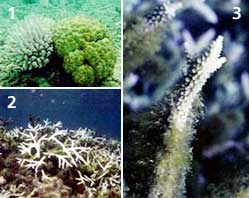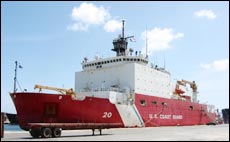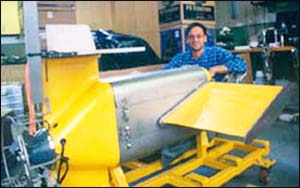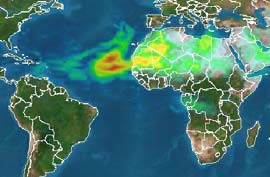Search Results for: ocean

Helping coral reefs survive climate change
While the high ocean surface temperatures during the 1997-98 El Nino bleached coral reefs in more than 50 tropical countries worldwide, patches of coral did survive in or near the damaged reefs. A new study of these patches identifies factors likely to protect these threatened marine ecosystems during climate change.
“As baseline sea surface temperatures continue to rise, climate change may represent the single greatest threat to coral reefs worldwide,” say Jordan West of the U.S. En

UD scientists track freshwater flow from Arctic into the Atlantic
University of Delaware marine scientists are now working aboard the 420-foot U.S. Coast Guard icebreaker Healy on a National Science Foundation project to track the fresh water flowing out of the Arctic Ocean into the Atlantic. This fresh water, from melting ice and rivers, affects the salinity and circulation of the ocean and thus has a major influence on the Earth’s climate.
“Freshwater discharge from the Arctic to the North Atlantic is a crucial factor controlling global climate,”

Scientists with Hawaii Ocean Mixing Experiment Closing in on Puzzle of Ocean Energy
Scientists from six institutions, including Scripps Institution of Oceanography at the University of California, San Diego, are closing the gap in deciphering one of the most puzzling aspects of the world’s oceans. “Ocean mixing,” the complex motions of seawater that span large-scale phenomena down to tiny, centimeter-sized turbulent motion, serves a key role in redistributing heat throughout the oceans. Although ocean mixing is a key element in the climate system and important for sea life for d
New Location of Deep Convection May Exist in North Atlantic, Altering Views of Atmosphere-Ocean Interaction
Deep convection, or mixing, of ocean waters in the North Atlantic, widely thought to occur in only the Labrador Sea and the Mediterranean, may occur in a third location first proposed nearly 100 years ago by the explorer and oceanographer Fridtjof Nansen. The findings, reported this week in the journal Nature, may alter thinking about the ocean’s overturning circulation that affects earth’s climate.
An international team of scientists reports in Nature that convection, a pr
Farewell to the Earth and the Moon – ESA’s Mars Express successfully tests its instruments
ESA PR 44-2003. A unique view of our home planet and its natural satellite – the Moon – is one of the first data sets coming from ESA’’s Mars Express.
“It is very good news for the mission,” says ESA’’s Mars Express Project Scientist, Agustin Chicarro. These and other data, such as those recording the major constituents of Earth as seen from space, are the actual proof that the instruments on board Mars Express, launched 2 June 2003, are working perfectly.
The routine check-outs

Dust deals droughts, deluges
Dust from the Sahara Desert in Africa may help modify clouds and rainfall both in Africa and across the tropical North Atlantic, as far away as Barbados, according to a study that uses 16 years of data from NASA satellites, ground measurements and computer models.
The dust particles act as surfaces, or kernels, for water vapor to attach to in low clouds, and for ice crystals to form around in higher clouds.
The study’s authors, Natalie Mahowald, a researcher at the National C